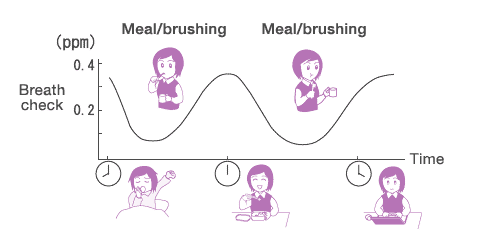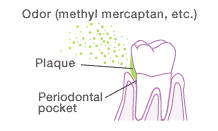There are various causes of bad breath. It occurs to any of us in our day-to-day life, such as when we wake up or when we are hungry, not just when we eat strong-smelling foods.

-
- There are “physiological”, “exogenous”, “pathologic” and “psychogenic” causes for bad breath.
- Bad breath can occur to any of us in our day-to-day life, not just when we eat strong-smelling foods.
What is Bad Breath?
It is said that over 80% of the causes for bad breath exist in our mouth. If you become concerned about your breath, have it checked at a dental clinic.
Causes for Bad Breath and the Occurrence of Bad Breath Mechanism
Bad breath can largely be divided into the following four types: “physiological” bad breath, caused by bacteria growth due to decreased saliva production at times such as when awakening, when we are hungry or when we are nervous; “exogenous” bad breath, caused by cigarettes or strong-smelling foods, “pathologic” bad breath, caused by caries or periodontal disease; and “psychogenic” bad breath, in which only identified by oneself but not detected by others.
Components Causing Bad Breath
It is believed that bad breath is mainly caused by volatile sulfur compounds. Volatile sulfur compounds mainly consist of the following three gases.
- Hydrogen sulfide (rotten egg-like odor)
- Methyl mercaptan (rotten onion-like odor)
- Dimethyl sulfide (rotten cabbage-like odor)
Types of Bad Breath
Physiological Bad Breath
- Caused by bacteria growth due to decreased saliva production at times such as when awakening, when we are hungry, or when we are nervous
- Caused by the dirtiness inside the mouth, such as plaque or food residue
- Caused by tongue plaque, which is a white moss-like plaque that builds up on the tongue’s surface

Changes in Physiological Bad Breath throughout the Day
Exogenous Bad Breath
- Occurs after eating strong-smelling foods (garlic, chives, etc.), after drinking alcohol or after smoking
Pathologic Bad Breath
- Bad breath due to causes that exist in our mouth: periodontal disease, advanced caries
- Bad breath due to causes that exist throughout the entire body: diseases in the nose or throat, respiratory diseases or digestive diseases
Psychogenic Bad Breath
- Even though no bad breath is detected in a person during a bad breath check, the person believes that they have bad breath. This type of bad breath often occurs when we are stressed or mentally unstable.

-
Relationship between gingivitis and bad breath
If your gums are inflamed, bacteria break down proteins such as crevicular fluid or food residue in the periodontal pockets (grooves on the gum lines), creating a strong odor.

Bad Breath due to Causes Existing Inside the Mouth



